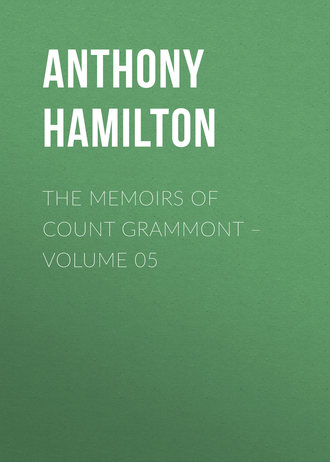
Anthony Hamilton
The Memoirs of Count Grammont – Volume 05
He followed this advice like a wise and tractable man; and some time after, returning to his old mistress in France, he began to lay in a store of politics for those important negotiations in which he has since been employed.
It was not till after his departure that the Chevalier de Grammont heard of the amorous declaration he had made: this was a confidence of no great importance; it, however, saved Tambonneau from some ridicule which might have fallen to his share before he went away. His colleague, Flamarens, deprived of his support, soon perceived that he was not likely to meet in England with the success he had expected, both from love and fortune: but Lord Falmouth, ever attentive to the glory of his master, in the relief of illustrious men in distress, provided for his subsistence, and Lady Southesk for his pleasures: he obtained a pension from the king, and from her everything he desired; and most happy was it for him that she had no other present to bestow but that of her heart.
It was at this time that Talbot, whom we have before mentioned, and who was afterwards created Duke of Tyrconnel, fell in love with Miss Hamilton. There was not a more genteel man at court: he was indeed but a younger brother, though of a very ancient family, which, however, was not very considerable either for its renown or its riches; and though he was naturally of a careless disposition, yet, being intent upon making his fortune, and much in favour with the Duke of York, and fortune likewise favouring him at play, he had improved both so well that he was in possession of about forty thousand pounds a year in land. He offered himself to Miss Hamilton, with this fortune, together with the almost certain hopes of being made a peer of the realm, by his master's credit; and, over-and-above all, as many sacrifices as she could desire of Lady Shrewsbury's letters, pictures, and hair; curiosities which, indeed, are reckoned for nothing in housekeeping, but which testify strongly in favour of the sincerity and merit of a lover.
Such a rival was not to be despised; and the Chevalier de Grammont thought him the more dangerous, as he perceived that Talbot was desperately in love; that he was not a man to be discouraged by a first repulse; that he had too much sense and good breeding to draw upon himself either contempt or coldness by too great eagerness; and, besides this, his brothers began to frequent the house. One of these brothers was almoner to the queen, an intriguing Jesuit, and a great match-maker: the other was what was called a lay-monk, who had nothing of his order but the immorality and infamy of character which is ascribed to them; and withal, frank and free, and sometimes entertaining, but ever ready to speak bold and offensive truths, and to do good offices.
When the Chevalier de Grammont reflected upon all these things, there certainly was strong ground for uneasiness: nor was the indifference which Miss Hamilton showed for the addresses of his rival sufficient to remove his fears; for being absolutely dependent on her father's will, she could only answer for her own intentions: but Fortune, who seemed to have taken him under her protection in England, now delivered him from all his uneasiness.
Talbot had for many years stood forward as the patron of the distressed Irish: this zeal for his countrymen was certainly very commendable in itself; at the same time, however, it was not altogether free from self-interest: for, out of all the estates he had, through his credit, procured the restoration of to their primitive owners, he had always obtained some small compensation for himself; but, as each owner found his advantage in it, no complaint was made. Nevertheless, as it is very difficult to use fortune and favour with moderation, and not to swell with the gales of prosperity, some of his proceedings had an air of haughtiness and independence, which offended the Duke of Ormond, then Lord Lieutenant of Ireland, as injurious to his Grace's authority. The Duke resented this behaviour with great spirit. As there certainly was a great difference between them, both as to their birth and rank, and to their credit, it had been prudent in Talbot to have had recourse to apologies and submission; but such conduct appeared to him base, and unworthy for a man of his importance to submit to: he accordingly acted with haughtiness and insolence; but he was soon convinced of his error; for, having inconsiderately launched out into some arrogant expressions, which it neither became him to utter nor the Duke of Ormond to forgive, he was sent prisoner to the Tower, from whence he could not be released until he had made all necessary submissions to his Grace: he therefore employed all his friends for that purpose, and was obliged to yield more to get out of this scrape than would have been necessary to have avoided it. By this imprudent conduct he lost all hopes of marrying into a family, which, after such a proceeding, was not likely to listen to any proposal from him.
[A very exact account of this transaction is given by Lord Clarendon, by which it appears, that Talbot was committed to the Tower for threatening to assassinate the Duke of Ormond. – Continuation of Clarendon, p. 362.]
It was with great difficulty and mortification that he was obliged to suppress a passion which had made far greater progress in his heart than this quarrel had done good to his affairs. This being the case, he was of opinion that his presence was necessary in Ireland, and that he was better out of the way of Miss Hamilton, to remove those impressions which still troubled his repose: his departure, therefore, soon followed this resolution.
Talbot played deep, and was tolerably forgetful: the Chevalier de Grammont won three or four hundred guineas of him the very evening on which he was sent to the Tower. That accident had made him forget his usual punctuality in paying the next morning whatever he had lost over-night; and this debt had so far escaped his memory, that it never once occurred to him after he was enlarged. The Chevalier de Grammont, who saw him at his departure, without taking the least notice of the money he owed him, wished him a good journey; and, having met him at court, as he came to take his leave of the king: "Talbot," said he, "if my services can be of any use to you during your absence, you have but to command them: you know old Russell has left his nephew as his resident with Miss Hamilton: if you please, I will act for you in the same capacity. Adieu, God bless you: be sure not to fall sick upon the road; but if you should, pray remember me in your will." Talbot, who, upon this compliment, immediately recollected the money he owed the Chevalier, burst out a-laughing, and embracing him: "My dear Chevalier," said he, "I am so much obliged to you for your offer, that I resign you my mistress, and will send you your money instantly." The Chevalier de Grammont possessed a thousand of these genteel ways of refreshing the memories of those persons who were apt to be forgetful in their payments. The following is the method he used some years after with Lord Cornwallis: this lord had married the daughter of Sir Stephen Fox, – treasurer of the king's household, one of the richest and most regular men in England. His son-in-law, on the contrary, was a young spendthrift, was very extravagant, loved gaming, lost as much as any one would trust him, but was not quite so ready at paying. His father-in-law disapproved of his conduct, paid his debts, and gave him a lecture at the same time. The Chevalier de Grammont had won of him a thousand or twelve hundred guineas, which he heard no tidings of, although he was upon the eve of his departure, and he had taken leave of Cornwallis in a more particular manner than any other person. This obliged the Chevalier to write him a billet, which was rather laconic. It was this:
"MY LORD,
"Pray remember the Count de Grammont, and do not forget Sir Stephen Fox."
To return to Talbot: he went away more concerned than became a man who had voluntarily resigned his mistress to another: neither his stay in Ireland, nor his solicitude about his domestic affairs, perfectly cured him; and if at his return he found himself disengaged from Miss Hamilton's chains, it was only to exchange them for others. The alteration that had taken place in the two courts occasioned this change in him, as we shall see in the sequel.
We have hitherto only mentioned the queen's maids of honour, upon account of Miss Stewart and Miss Warmestre the others were Miss Bellenden, Mademoiselle de la Garde and Mademoiselle Bardou, all maids of honour, as it pleased God.
Miss Bellenden was no beauty, but was a good-natured girl, whose chief merit consisted in being plump and fresh-coloured; and who, not having a sufficient stock of wit to be a coquette in form, used all her endeavours to please every person by her complaisance. Mademoiselle de la Garde, and Mademoiselle Bardou, both French, had been preferred to their places by the queen dowager: the first was a little brunette, who was continually meddling in the affairs of her companions; and the other by all means claimed the rank of a maid of honour, though she only lodged with the others, and both her title and services were constantly contested.
It was hardly possible for a woman to be more ugly, with so fine a shape; but as a recompense, her ugliness was set off with every art. The use she was put to, was to dance with Flamarens, and sometimes, towards the conclusion of a ball, possessed of castanets and effrontery, she would dance some figured saraband or other, which amused the court. Let us now see in what manner this ended.
As Miss Stewart was very seldom in waiting on the queen, she was scarcely considered as a maid of honour: the others went off almost at the same time, by different adventures; and this is the history of Miss Warmestre, whom we have before mentioned, when speaking of the Chevalier de Grammont.
Lord Taaffe, eldest son of the Earl of Carlingford, was supposed to be in love with her; and Miss Warmestre not only imagined it was so, but likewise persuaded herself that he would not fail to marry her the first opportunity; and in the mean time she thought it her duty to entertain him with all the civility imaginable. Taaffe had made the Duke of Richmond his confidant: these two were particularly attached to each other; but still more so to wine. The Duke of Richmond, notwithstanding his birth, made but an indifferent figure at court; and the king respected him still less than his courtiers did: and perhaps it was in order to court his majesty's favour that he thought proper to fall in love with Miss Stewart. The Duke and Lord Taaffe made each other the confidants of their respective engagements; and these were the measures they took to put their designs in execution. Little Mademoiselle de la Gardet was charged to acquaint Miss Stewart that the Duke of Richmond was dying of love for her, and that when he ogled her in public it was a certain sign that he was ready to marry her, as soon as ever she would consent.
Taaffe had no commission to give the little ambassadress for Miss Warmestre; for there everything was already arranged; but she was charged to settle and provide some conveniences which were still wanting for the freedom of their commerce, such as to have free egress and regress to her at all hours of the day or night: this appeared difficult to be obtained, but it was, however, at length accomplished.
The governess of the maids of honour, who for the world would not have connived at anything that was not fair and honourable, consented that they should sup as often as they pleased in Miss Warmestre's apartments, provided their intentions were honourable, and she one of the company. The good old lady was particularly fond of green oysters, and had no aversion to Spanish wine: she was certain of finding at every one of these suppers two barrels of oysters; one to be eaten with the party, and the other for her to carry away: as soon, therefore, as she had taken her dose of wine, she took her leave of the company.
It was much about the time that the Chevalier de Grammont had cast his eyes upon Miss Warmestre, that this kind of life was led in her chamber. God knows how many ham pies, bottles of wine, and other products of his lordship's liberality were there consumed!
In the midst of these nocturnal festivals, and of this innocent commerce, a relation of Killegrew's came up to London about a lawsuit: he gained his cause, but nearly lost his senses.
He was a country gentleman, who had been a widower about six months, and was possessed of fifteen or sixteen thousand pounds a-year: the good man, who had no business at court, went thither merely to see his cousin Killegrew, who could have dispensed with his visits. He there saw Miss Warmestre; and at first sight fell in love with her. His passion increased to such a degree that, having no rest either by day or night, he was obliged to have recourse to extraordinary remedies; he therefore early one morning called upon his cousin Killegrew, told him his case, and desired him to demand Miss Warmestre in marriage for him.
Killegrew was struck with wonder and astonishment when he heard his design: nor could he cease wondering at what sort of creature, of all the women in London, his cousin had resolved upon marrying. It was some time before Killegrew could believe that he was in earnest; but when he was convinced that he was, he began to enumerate the dangers and inconveniences attending so rash an enterprise. He told him that a girl educated at court, was a terrible piece of furniture for the country; that to carry her thither against her inclination, would as effectually rob him of his happiness and repose, as if he was transported to hell; that if he consented to let her stay, he needed only to compute what it would cost him in equipage, table, clothes, and gaming-money, to maintain her in London according to her caprices; and then to cast up how long his fifteen thousand a-year would last.
His cousin had already formed this computation; but, finding his reason less potent than his love, he remained fixed in his resolution; and Killegrew, yielding at length to his importunities, went and offered his cousin, bound hand and foot, to the victorious fair. As he dreaded nothing more than a compliance on her part, so nothing could astonish him more than the contempt with which she received his proposal. The scorn with which she refused him, made him believe that she was sure of Lord Taaffe, and wonder how a girl like her could find out two men who would venture to marry her. He hastened to relate this refusal, with all the most aggravating circumstances, as the best news he could carry to his cousin; but his cousin would not believe him: he supposed that Killegrew disguised the truth, for the same reasons he had already alleged; and not daring to mention the matter any more to him, he resolved to wait upon her himself. He summoned all his courage for the enterprise, and got his compliment by heart; but as soon as he had opened his mouth for the purpose, she told him he might have saved himself the trouble of calling on her about such a ridiculous affair; that she had already given her answer to Killegrew; and that she neither had, nor ever should have, any other to give; which words she accompanied with all the severity with which importunate demands are usually refused.
He was more affected than confounded at this repulse: everything became odious to him in London, and he himself more so than all the rest: he therefore left town, without taking leave of his cousin, went back to his country seat, and thinking it would be impossible for him to live without the inhuman fair, he resolved to neglect no opportunity in his power to hasten his death.
But whilst, in order to indulge his sorrow, he had forsaken all intercourse with dogs and horses; that is to say, renounced all the delights and endearments of a country squire, the scornful nymph, who was certainly mistaken in her reckoning, took the liberty of being brought to-bed in the face of the whole court.
An adventure so public made no small noise, as we may very well imagine: all the prudes at court at once broke loose upon it; and those principally, whose age or persons secured them from any such scandal, were the most inveterate, and cried most loudly for justice. But the governess of the maids of honour, who might have been called to an account for it, affirmed that it was nothing at all, and that she was possessed of circumstances which would at once silence all censorious tongues. She had an audience of the queen, in order to unfold the mystery; and related to her majesty how everything had passed with her consent, that is to say, upon honourable terms.







